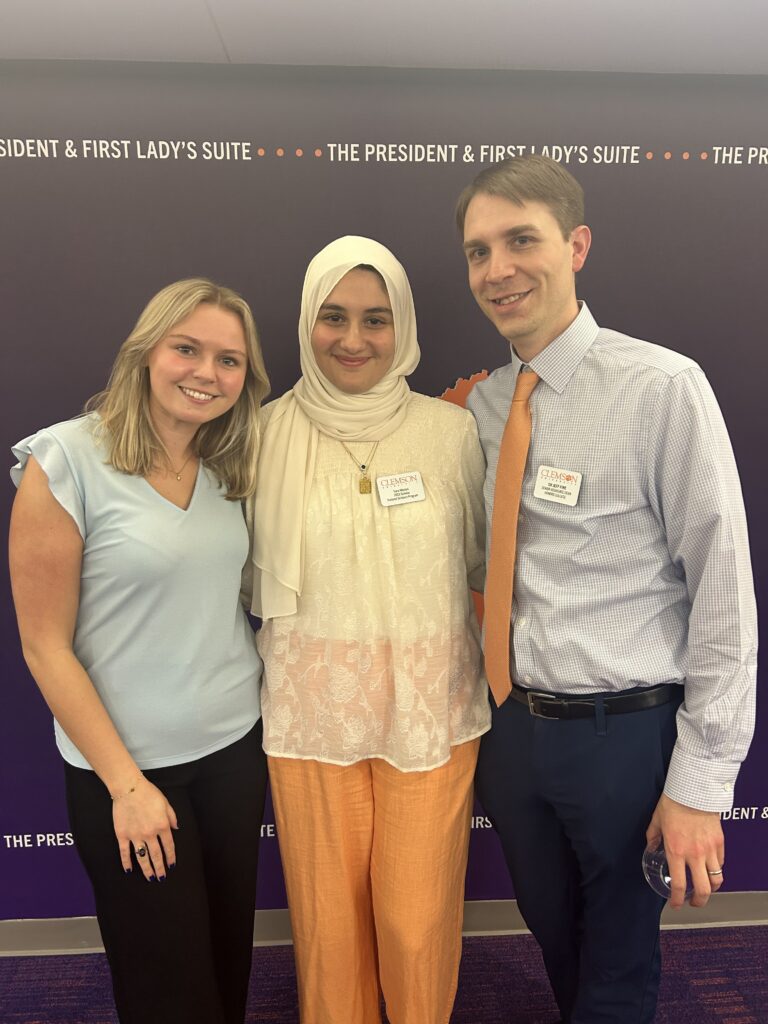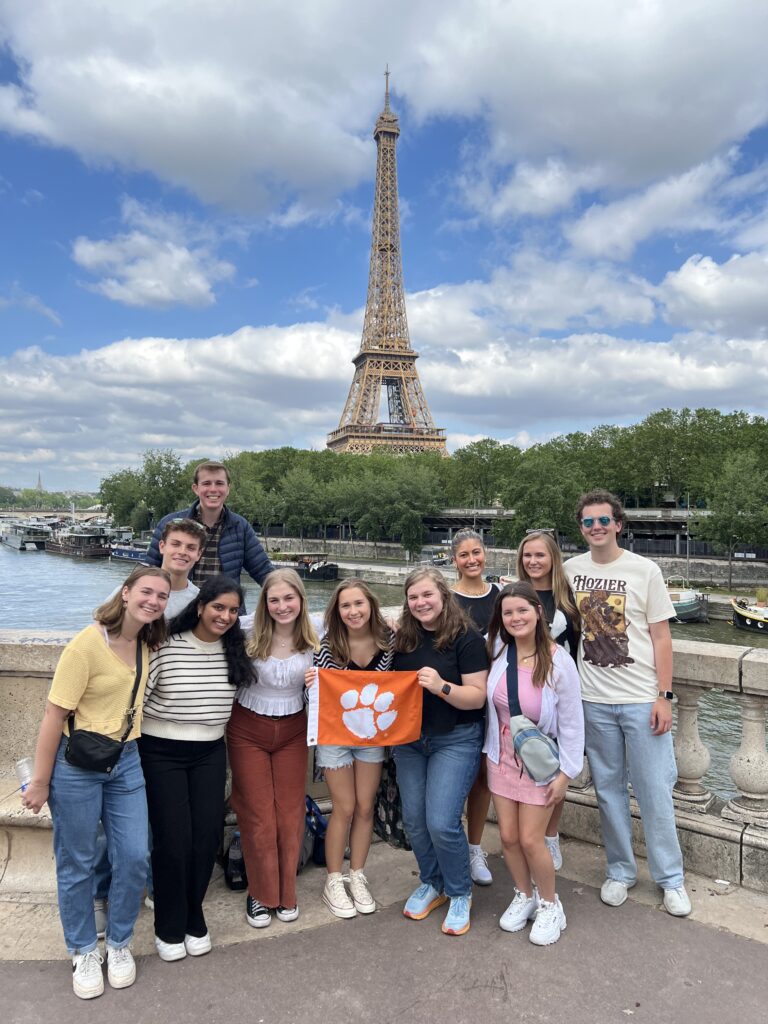Charles Taylor graduated from the policy studies Ph.D. program in 2008. During the ceremony, he sat next to his advisor, political science professor Adam Warber, Ph.D. Taylor said the day was a blur, but he remembers being hooded and having the provost and president congratulate him.
“My mom and stepdad drove in from Missouri,” Taylor said. “It was an amazing moment, and I was happy advisors were included in the ceremony.”
That day was the culmination of five years of work for Taylor – and for Warber, it was one of the fondest memories of his tenure in the Department of Political Science. Taylor was the first Ph.D. student he had advised, served as dissertation committee chair for and hooded.
Established in July 1974, the department has undergone significant growth over the last half-century. Today, it serves more than 500 undergraduate and graduate students.
A little piece of history
Did you know that within a year of the department’s forming, the first edition of The Journal of Political Science was published at Clemson? For 30 years, Clemson published the journal until it moved to Coastal Carolina University in 2009. Read more history nuggets here.
For students, the Department offers:
- a bachelor of arts and a bachelor of science degree,
- a master’s in public administration,
- a Ph.D. in policy studies,
- four undergraduate minors political science, public policy, global politics, and political and legal theory,
- Creative Inquiry research opportunities,
- Study abroad partnerships and faculty exchange programs in Serbia with the University of Belgrade,
- South Carolina Student Legislature, a student-led simulation of the South Carolina General Assembly,
- The Clemson International Relations Association, a student organization promoting and carrying out international relations activities across campus,
- the Pi Sigma Alpha Honor Society,
- Graduate certificate programs in Policy Studies, Public Administration, Emergency Management and Homeland Defense and Security, and
- unwaveringly dedicated professors.
Both current students and alumni agree that the political science faculty’s dedication to their students is the foundation for these programs’ success and the reason for the department’s enduring strength. Over the years, political science faculty have won numerous teaching awards including, the Alumni Master Teacher Award, Centennial Professorship Award.
“Our discipline is very different from others,” said Warber. “When students come in as first years, it is not always clear what they want to do, but they start taking courses and doors start to open for them.”
Chip Taylor chose Warber as his dissertation committee chair because of his dedication to his students. Taylor saw the work Warber put into his classes and knew he would be an excellent advisor. Warber read draft after draft of Taylor’s dissertation and helped him prepare for interviews for teaching positions at various colleges. Taylor recalls how faculty members Joe Stewart, Ph.D., and Bruce Ransom, Ph.D., joined Warber in his efforts to prepare Taylor for life after his dissertation defense.
“My Ph.D. coursework took three years, and then I spent two years on my dissertation – and Dr. Warber was there every step of the way,” said Taylor, a professor at Ball State University. “When I defended my dissertation, the committee did not ask a single question that Stewart, Warber and Ransom had not prepared me to answer.”
The loss of Joe Stewart profoundly impacted the department, and his absence is still felt today.
Excerpt from the Tiger: On Aug. 21, Clemson University’s political science program lost a member of its department who served as a cornerstone to the success of its students.
Joseph Stewart, a member of Clemson’s faculty since 2005, according to the University will be sorely missed by his community.
According to the College of Behavioral, Social and Health Sciences, Stewart gained a considerable amount of recognition for his work in political science and was named Citizen of the Year in the Law Related Education Division by the South Carolina Bar Association.
His legacy will mostly be remembered through his kindness and humor, as shown by various Clemson students who reflected on his dedication to teaching and guiding students. He specialized in areas of political science regarding law, courts and politics, public policy and American government. Read more.
Junior Sara Alkelani was inspired to apply for and complete an internship at the Arab American Institute this past summer because of the department’s supportive faculty members.

According to Alkelani, faculty members like Jeffrey Fine, professor of political science, encourage students to pursue unique educational opportunities and share their connections and resources to elevate students’ experiences.
“Getting to know Dr. Fine was a pivotal moment for me. Through him, I was introduced to Nadia Aziz, an alumna who works at the Arab American Institute,” Alkelani said. “Nadia’s guidance and support were instrumental in securing my internship this summer where I gained invaluable experience in advocacy and policy work.”
This internship was the first major step in the career she is planning to pursue: immigration law.
Through the growth of the department over the last 50 years, faculty from diverse backgrounds have joined the department ranks, something students value.
“The faculty members come from various backgrounds, and they bring a wealth of knowledge from different subfields of political science, such as international relations, comparative politics and political theory,” Alkelani said. “This diversity allows students to explore a wide range of topics and find their niche in the field.”

Briggs Murray was motivated to pursue political science as a major after faculty members encouraged him to participate in the Dixon Global Policy Scholars – an Honors College program – which sent him to Paris, France, and Berlin, Germany.
“I have taken a smattering of classes at Clemson, including political theory, quantitative methods and African politics,” Murray said. “Each class has left me beyond impressed with the dedication that each faculty member brings to their professions and to the classroom.”
Faculty-directed study abroad programs, engaging clubs and organizations, dozens of course options and a diverse range of research and creative inquiry programs are just a few of the amazing educational and enrichment opportunities for students.
Briggs Murray, class of 2027
As administration and faculty look to the future of the department, they will continue to prioritize academic excellence and engaged student experiences with new courses and degree options emphasizing global politics. They will expand graduate programs in public administration and policy studies and increase the visibility and impact of faculty members’ research programs.
“Over the last half a century, the political science department has been dedicated to the pursuit of excellence in teaching and scholarship, and these will remain our central commitments as we expand and enrich our undergraduate and graduate programs,” said Political Science chair Joe Ura. “I’m excited for the next half century of political science at Clemson.”













The Department of Political Science is in the College of Behavioral, Social and Health Sciences (CBSHS). Established in July 2016, CBSHS is a 21st-century, land-grant college that combines work in nine disciplines – communication; nursing; parks, recreation and tourism management; political science; psychology; public health sciences; sociology, anthropology and criminal justice – to further its mission of “building people and communities” in South Carolina and beyond.
Get in touch and we will connect you with the author or another expert.
Or email us at news@clemson.edu

